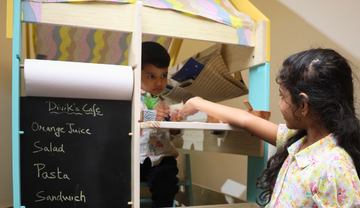‘Does Montessori support pretend play?’ is an often-asked question by parents and guides. Pretend play is when children imitate situations, they encounter using props and imaginary tools. Dr Montessori was all for pretend play!
“Imitation is the tool given by nature to children to help them adapt to the particular place where they were born and that enables them to adapt to the customs of their specific environment.” – Maria Montessori, The 1946 London Lectures.

Imitation is the cognitive ability of children to reproduce what they have learned from their environment. Children want to be a part of their world, and they adapt to their local traditions and customs. When they are given opportunities to not only mimic adults but also contribute to their surroundings, their self-esteem, learning, and independence develop tremendously.
For example, it is a common sight to see toddlers pretending to cook on a little plastic stove or make ‘zoom-zoom’ noises while seated inside a little cardboard box. What if we gave them the right tools that are both child-sized and functional and can help them contribute to the kitchen or even clean their tricycle? They develop not only independence, but a respect for the labour involved, understand cause, and effect, and add to their wealth of sensorial impressions. Not to mention, their fine and gross motor skills improve tremendously.
Toddlers and young children enjoy make-believe play, which may sometimes be based on real-life scenarios. Older children often incorporate elements of fantasy into their pretend play, drawing inspiration from literature and media. However, Dr Montessori believed that such behaviour could negatively impact a child's development in their early years. As young children are still learning about their environment and the world around them, it takes time for them to distinguish between reality and fantasy. When children aged between 3-6 years are exposed to fantasy elements, they may become distracted and talk about imaginary characters as if they were real, which could cause night terrors.

Pretend play is an essential part of a child's development, and we can help them by creating the perfect setup. With enough space and the tools, they need, children can even use real objects to enhance their imaginative play! Have you considered a playhouse for your child's pretend play? The one Ariro has is an excellent option, providing an environment where children can run a home, restaurant, or school. Its writing desk, bookholders, and blackboard are perfect tools for children to explore their creativity and expand their imaginations.
As the child grows, the playhouse can be a castle to defend, a school for magic or the cabin of a pirate ship! It can also be a reading corner for them to explore these new worlds, curled up on a beanbag or mattress.

The playhouse is an excellent choice for toddlers who are exploring their enclosing schema. Schemas refer to repeated behaviours that children exhibit as they try to understand the world around them. Think of it as if they are building pathways in their brains by repeatedly performing these actions. Children who are engaged in enclosing schema will often try to enclose objects and their bodies within physical boundaries. For instance, they might create a cosy spot by draping a bedsheet over dining chairs or sit inside a cardboard box with all their toys. Alternatively, they might attempt to place all their toys within enclosures, and we can provide them with scarves, building blocks, and cardboard boxes to help them. Enclosing schema allows them to better understand the space around them, build trust in their safe spaces, and provides opportunities for creative and constructive play. The playhouse by Ariro is the perfect cozy nook for your little one, and a place for memories to be made as they grow up!






